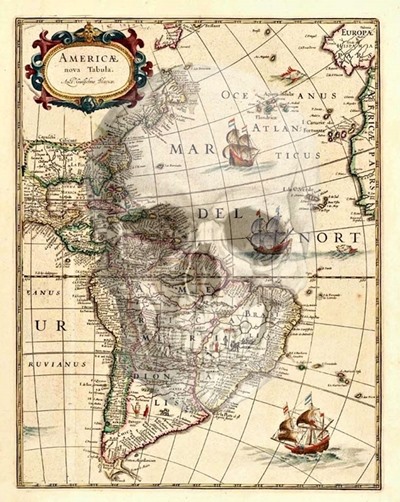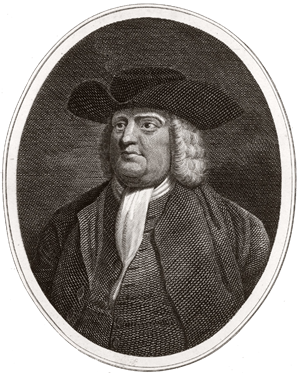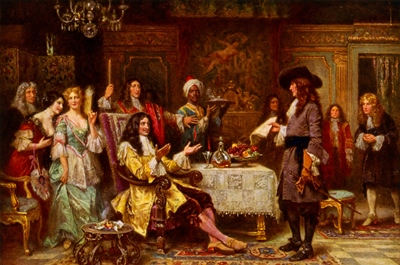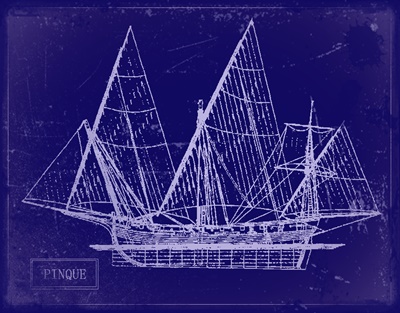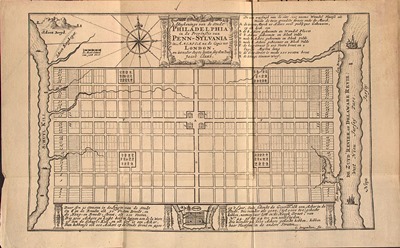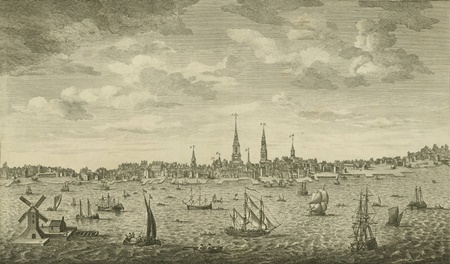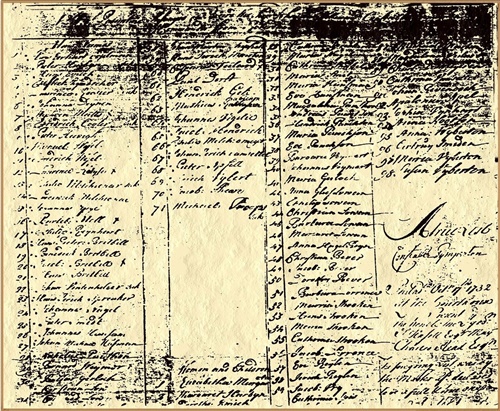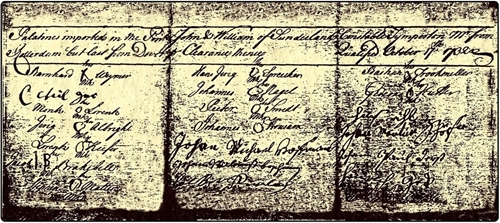














|
|
|
Murder Lurks
on the
Pink John and William
By Rick Bushong 2012
Revised: December 2014
Revised: June 4, 2024 source4
|
|
In 1732, a long and lethal transatlantic crossing, ended when the Pink John and William, finally docked in Philadelphia. For the entire voyage, none aboard were aware, that one amongst them was being stalked by more than starvation and disease. None but one, a fellow voyager, whom they trusted. But this voyager was no immigrant, seeking freedom, he was an assassin, who had boarded with them over five months earlier in Rotterdam, Holland. When he joined the desperate but hopeful refugees, they had totaled 220, now they could only count 169, still alive.1;2 Soon, there would be one less.3;4
|
|
"But they were bound for the country of
William Penn's new land!"
William Penn, founder of Pennsylvania.
|
|
The day, the John and William arrived, in Philadelphia, one of the surviving passengers was Joseph Bernard Hubley, (listed on the ship's manifest as Joseph Houbly).1 As the tale goes, in 1685, Hubley, a Protestant and his young wife, fled the harsh and intolerant Catholic rule, in France into Switzerland.3 They were forced into exile, because of the revocation of the Edict of Nantes, which began a new period of religious persecution by the Jesuits.5 Later, from Switzerland, again threatened by Jesuits, they made their way into Germany where they lived for a few years. While in Germany, Hubley and his wife had three children, but sadly, Mrs. Hubley died, leaving Hubley with two sons and a daughter to raise.3 Hubley, was an affluent man and by this time had become well educated. He was also a writer. After he fled the terrors of the Jesuits into Switzerland and later Germany, he began to prolifically write papers and discourses, all highly critical and extremely revealing.3 His subject was the systematic oppression of the Protestants, at the hands of the Jesuits all in the name of the Catholic Church. In time his writings became more and more circulated and quite popular. With this, Hubley became wealthy and gained a certain degree of notoriety. Eventually, some of his manuscripts fell into the hands of the Catholic Church, and they were quickly deemed heresy. That made Hubley a heretic.3;4
In France, in the late 17th and early 18th century, the deplorable Catholic oppression of the Protestants, was led by the Jesuits. Their systematic enforcement of the Catholic doctrine brought the full weight of the church to bear on all Protestants and brutally created countless refugees. Many of the refugees had only been living in France a decade or two, themselves, already refugees of prior Catholic persecution in Switzerland and surrounding countries. The Jesuits were part of a Roman Catholic religious order, called the Society of Jesus. The order's influence had been growing for many years and its ranks were swollen with members who all swore total loyalty to the pope. This quasi-army of Jesuit priests were particularly known for their willingness to go wherever they were ordered and to zealously carry out whatever they were told to do. It resulted in the torture and martyrdom of untold numbers of victims.6
|
It was from this world that in 1732, grieving the death of his wife, Joseph Hubley decided to emigrate to America. He hoped to make a fresh start for himself and his children in Penn's Woods as well as to get far away from any Jesuit threat. By 1732, some 50 years after William Penn's colony was created, it had become well known for religious tolerance and the availability of land. Penn himself, had set out guidelines in 1682 when he drew up the Pennsylvania Frame of Government. He determined, freedom of worship in the colony was to be absolute, and all the traditional rights of Englishmen were carefully safeguarded. To do so, Penn's charter called for the creation of a political utopia that guaranteed a free and fair trial by jury, freedom of religion, freedom from unjust imprisonment and free elections.7
Hubley became determined to reach this utopia, so he packed his possessions and his money in the form of gold into heavy chests and left Germany. With his sons, Bernard and Michael, and a daughter Susan, they traveled, inevitably by boat or barge, down the Rhine River.3 Their initial destination was Rotterdam, Holland, a trip that could take up to six weeks, but it was the largest port for transport to the Americas. Once in Rotterdam, which was full of desperate refugees, Hubley managed to find a ship with room, and made arrangements for passage to Philadelphia. The ship he found was the John and William, in command of Constable William Tymperton.1 They eventually boarded the small boat, which was of a Dutch design, called a Pink. Hubley, his children, and his chests, were added to the dark and already cramped confines, below deck, amongst the other passengers. In his possession were two chests filled with the heretical manuscripts.3 The John and William was small and very over-crowded, still they were full of hope, and were bound for William Penn's new land!
|
|
The Birth of Pennsylvania, by Jean Leon Gerome Ferris. March 4, 1681, William Penn, holds the charter to the lands that became Pennsylvania, just signed by King Charles II. They were added to Penn's already sizable holdings. Afterwards Penn wrote, "It is a clear and just thing, and my God who has given it me through many difficulties, will, I believe, bless and make it the seed of a nation."
|
But before they cast-off, another passenger boarded in Rotterdam, an older Frenchman. Shrouded in mystery, it is known, the man was posing as a valet, and had become Hubley's man-servant.3 Hubley had apparently met and hired the servant somewhere during his journey. It's not clear how the man got Hubley to trust him and take him along, but possibly, he feigned striking a bargain for his passage, on the John and William and in return agreed to be indentured.
|
|
A Pinque, or a Pink, as the British called them. One of the smallest ships involved with the colonial immigration. Only five of this type were ever used.
|
|
The voyage was the only transatlantic crossing, with passengers, for the Captain, and ship and it became long, deadly, and particularly grueling. Along the way 44 passengers died of starvation and disease.see article Then, before the John and William could arrive in Philadelphia, the boat was taken over by passengers, driven by hunger, a direct result of the extended time out to sea. Ironically, the mutiny actually made the voyage even longer, because when the John and William actually reached American shores, the mutineers, looking to avoid being captured had no idea where to land. They ordered Tymperton to sail the boat up and down the coast twice before they quit and commandeered a ship's rowboat. They made their way to shore, landing at Cape May on the New Jersey side of the Delaware Bay. As it turned out, some five days later, with no place else to go, the mutineers, walked into Philadelphia. They were in even worse condition, and were promptly arrested and imprisoned, while the ship had already arrived, ahead of them.2
So, finally the John and William sailed off of the ocean and onto the Delaware River. Now, top-side on the boat, Hubley, who was among the sick, along with other voyagers, reportedly crowded the deck, just to be in the sun and watch, as they sailed along the wide Delaware.1;3 They were seeing for the first time, the great forest that then covered Pennsylvania. With the end in sight, everything must have seemed full of promise and exciting. A few days later, on Sunday October 12, 1732, they sailed into Philadelphia harbor. It was a day said to be clear and serene. By Friday, the doctors had cleared the boat of having any serious disease, and the John and William pulled along side the dock. It had been a journey of unimaginable hardships, and far too many deaths, but their voyage was at an end.
|
Once in Philadelphia, Hubley met up with a family friend, who was already living there. He was a good friend and gave them refuge on their first night in America. Then he graciously offered for them to stay with him, while recuperating and getting acquainted with their new land. Hubley quickly agreed and had all his chests, including the two with the manuscripts, brought by wagon from the John and William. The old servant surely stayed close to the chests, as he was still in Hubley's employee.
Several weeks passed. Hubley and his children rested and spent time exploring the marvels of Philadelphia, getting used to their new country. Then, early one morning, the old French servant rushed to Hubley's friend with horrible news. The old man, excitedly explained, he had gone to Hubley's room, but when he got there, he had found his master lying dead.3 The household was entirely shocked and suspicious, as they were not expecting anything of the sort. Not surprisingly, a short time later, they discovered the servant himself had vanished along with all of the Hubley manuscripts.3 They were never seen again. It was only, after an investigation, that the entire plot was revealed. They determined the old Frenchman was actually a Jesuit Priest, sent as an assassin, to murderously enforce the Catholic Church's verdict of heresy, on the unwitting Hubley.3
|
|
|
William Penn's plans for Philadelphia, one of the first attempts at utopian city planning. Penn designed for growth with green spaces, parks and a rectilinear street layout, with some streets wider than London's.
|
An engraved sketch by George Heap, of Philadelphia viewed from New Jersey depicted as it looked in the 1730s. The numbers identify the various buildings. Number 6 is the Court House.
- Christ Church
- State House
- Academy
- Presbyterian Church
- Dutch Calvinist Church
- Court House
- Quaker Meeting House
- The Market Street wharf at the end of High Street
- Mulberry Street, (also called Race Street, the north limit of the city)
- Safsafras Street
|
|
It's hard to fathom that this Jesuit was actually on a secret mission for the church, disguised as a valet, with the sole purpose of destroying the heretical manuscripts and assassinating Hubley. To do so, he had been living with Hubley, his children and the other passengers, for the entire journey. For over six months, at least since Rotterdam, he had lurked, waiting for the right time to complete his mission. Just like the other passengers, he was inevitably marched to City Hall where he swore false allegiance to the British Crown. The oath meant nothing to him, as he followed only Catholic masters. Then, when the opportunity presented itself, he took the manuscripts and finished by killing Hubley. What dedication and fanaticism. Unfortunately, the imposter valet's name was not noted, but be sure, it's listed on Captain Tymperton's passenger manifest, below.
Joseph Hubley had endured a horrendous voyage, starvation and disease, all the way to the new world, only to fall to an assassin's hand. Although he lived in America a few short weeks, his name lived on, through his sons and their descendants. The newly orphaned Hubley children, were taken in by families in Lancaster County. In time, the sons, Bernard and Michael prospered and became prominent members of Pennsylvanian society, they helped establish the Hubley name in the history of Lancaster County, Pennsylvania.3;4
|
|
The End
Captain Tymperton's Passengers Manifest, for pink John and William 1732
|
Men over 16.
- Hans Earhart Vosselman
- Pieter Harbyn, sick
- Hans Emich
- Helflick Shedeicher
- Laurence Rosier, sick
- Johannes Deynen
- Stephen Matts
- Fridrich Cooler, sick
- Pieter Huvigh
- Michael Wysel
- Fridrich Wisel
- Laurence Keiyfer
- Philip Melchionar, sick
- Ludwick Melchionar
- Johannes Yege
- Bartel Moll
- Philip Reynhart
- Hans Pieter Britbill
- Benedick Britbill
- Jacob Britbill
- Hans Britbill
- Johan Vintenhelver, sick
- Hand Jerick Spreaker
- Johannes Nagel
- Pieter Smidt
- Johannes Hunsam
- Johan Michael Hufman
- Nicholas Paushon
- Bernard Weymer
- Balsar Gerloch
- Christian Low
- Conraed Low
- Ludwick Hugel
- Jacob Weyber
- Morris Lorrence
- Johannes Shook
- Hans Jacob Reyl
- Jerig Adam Stis
- Philip Jacob Proops, sick
- Michael Miller, sick
- Abraham Dubo
- Philip Dubo, sick
- Hans Jerick Roerbach
- Johan Michael Smit
- Adam Wilt
- Gerich Albrecht
- Antonius Albrecht
- Hans Woolf Doopel, sick
- Joseph Houbly, sick
- Hans Philip Glais
- Conrad Gets
- Nicholaus Kooger
- Jacob Kooger
- Mathias Menser
- Bastian Trookmiller
- Giedon Huffer
- Hans Reyl
- Johan Martin Shoppfield
- Casperrias Vielard
- Hans Jerich Martin
- Paul Derst
- Hendrick Gek
- Mathias Rubichon
- Johannes Vigelie
- Jacob Hendrick
- Philip Melchior Meyer
- Johan Jerich Vansettel
- Pieter Apfel
- Jerich Vybert
- Jacob Sheare
- Michael Proops,sick
|
|
A copy of the original Ships Manifest of the John and William.
Joseph Hubley is #49,. And the elderly French valet? Who knows?
Page one of the John and William passenger allegiance oath signatures.
Hubley's is probably on a different page, as he was ill and would have signed later than sooner.
|
|

- A Collection of Upwards of Thirty Thousand Names of German, Swiss, Dutch, French and Other Immigrants in Pennsylvania;
page 85
- The Pennsylvania Gazette, Oct. 9-19, 1732, Ben Franklin, Publisher.
- Notes and Queries: Historical, Biographical and Genealogical,
edited by William Henry Egle, Published 1898; Hubley, page 200
- Notes and Queries, Volume, 1898, published 1899
Hubley, page 1
- Wikipedia; Edict of Nantes
- U-S-History.com; Jesuits
- Wikipedia; William Penn
Further Reading On Bushong United:
Further Reading:
- Anecdotae Eboracenses: Yorkshire anecdotes; or remarkable incidents in the ...
By Richard Vickerman Taylor. Published 1887 Page 81
- Greater Than the Mountains Was He: The True Story of Johann Jacob Shook of Haywood County, North Carolina.
By Wilma Hicks Simpson Published 2013 click here
- Pennsylvania Germans, A Persistent Minority. William T. Parsons. Collegeville, PA: Chestnut Books, 1985,
- The German immigration into Pennsylvania through the
port of Philadelphia from 1700 to 1775 part II: The
Redemptioners, by Frank Ried Diffenderffer, Published
1900
click here
- The English Spa, 1560-1815: A Social History, By Phyllis May Hembry, Published 1990 click here
|
|
|

